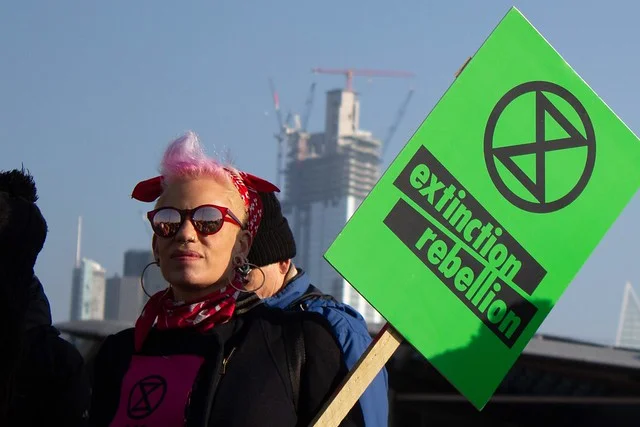Getting people to care about climate is difficult. Years of raising awareness about the looming environmental catastrophe have not resulted in popular demand to enact systematic change. The far less existential threat of Covid-19 has had a far bigger impact for the simple reason that people saw an immediate danger to themselves and acted.
For those of us who want to change society to mitigate the worst of rising global temperatures, there remains the elusive goal of finding a message that will cut through and finally effect real change. A message that will escape the echo chambers of middle-class lefties and convince people of the immediate need to act.
Social media noise
Social media seems to be the ideal tool for this as it allows climate activists to go directly to the public without the need to filter their message through the traditional media, much of which is hostile to the message that rapid social change is needed. However, more than 15 years of social media (Facebook was founded in 2004) has not moved us any closer to achieving the goal of a widespread awakening to the need for environmental change.
There is a lot of noise on social media, so for a climate message to cut through it needs to be attention grabbing. Remember it needs to hold people’s attention in a world where Donald Trump and Kayne West are creating a lot of noise.
Mindbombs
To find what works in the age of social media, inspiration can be drawn from the pre-digital age. It’s worth looking at Greenpeace, who pioneered a strategy they called the “mindbomb”. A 2015 article by Karl Mathiesen defines the mindbomb as: “an image that sends a collective shock through the world leading to action.” This can be seen as a precursor to today’s viral memes.
The original Greenpeace mindbomb was footage of a Russian whaling ship, hunting whales with harpoons in the Arctic, shot from a rubber speed boat in 1975. Over the years Greenpeace has been adept at creating images that stick in the public's mind and prompt action.
Jerry Rothwell, who directed an award-winning 2015 film about Greenpeace called How to Change the World talked in Mathiesen’s article about the importance of bearing witness to an event in creating mindbombs. “Things like Ferguson, the witnessing of an event can still have the power to get people to active and out on the streets and protesting,” he said.
The problem with relying on social media
So, we need to create social media mindbombs that grab attention. However, to cut through all the noise on social media these mindbombs have to be really attention grabbing. Rothwell had criticisms of many contemporary activists, he said: “There’s been a tendency within the organisation to just paint a banner and hang it off a famous building and I think that just doesn’t wash, it’s just not interesting enough.”
There is a problem with relying on social media to deploy mindbombs to spread a story, which is that social media can distract us from or distort our goals. Social media is very good at getting our attention. It’s on our phones, carried with us everywhere we go and is constantly using push notifications to get us to stop what we’re doing and pay attention to it. Social media is good at holding what psychologists call the “spotlight” of our attention - i.e. what we are focusing on right now - but in doing this it distorts our desires and goals.
Distorted goals
Former Google employee and winner of the Three Dots prize James Williams explains this in his book Stand Out of Our Light: Freedom and Resistance in the Attention Economy that as well as distracting our spotlight, what we are paying attention to now, social media can distract our “starlight”, which is our ability to navigate by our higher goals and values, our guiding stars.
Williams argues that social media distracts our starlight by changing our actions so that we are no longer guided by our values, but instead we are guided by the goals of social media platforms. Williams says that when our starlight is distracted it makes us want simple pleasures over complex ones and short-term rewards over long-term ones. It means that we can’t live our lives according to the values we want to live by.
This happens when reach, shares, clicks and engagements on social media take the place of our higher goals such as changing minds or prompting people to take action. 10,000 shares is not 10,000 people convinced. It’s probably not 100 people convinced. It’s just more time spent on social media, seeing more ads and having more of our data extracted to sell to advertisers.
Owning the libs or being owned by platforms?
This becomes political when a movement’s higher goals become replaced by reaching people on social media. Political movements become distracted from their starlight when they focus on increasing their metrics on social media platforms instead of winning people over to their cause. This happens when a political movement believes that 10,00 shares is 10,000 people convinced.
This can be most easily seen with the America right. They have become obsessed by sharing videos of Ben Shapiro or Jordan Peterson “owning libs” as their support shrinks to a narrower and more radicalised section of society. The US right’s goals have been replaced by that of social media platforms to such a degree that they are constantly sharing content that holds attention, whilst not stopping to think that a video of Shapiro shouting over a college student isn’t convincing anyone who wasn’t already signed up to their agenda.
Stories not content
This should be a lesson for the environmental movement when creating social media mindbombs. Yes they get attention, but are they serving our goals or the goals of social media platforms? It might be better to create attention grabbing stories, rather than attention grabbing social media content.
We need a story that people can believe in, that becomes their goals or starlight. When we are all motivated by our starlight to make this world a greener, fairer, better place changing the world will be easy.
Middle-class, hipster environmentalism
As middle-class environmentalists it's tempting to make this story we want to tell a reflection of our values and lifestyles. Our advocating for economic change needs to go beyond wanting the economy to be based locally, producing organic craft beer and avocado toast. These specific examples are deliberately stereotypical, but they serve to make the general point that we mustn’t make the story we tell about a greener future one where we shop differently but everything else is the same.
Something that appears cool and desirable to middle-class Westerns might not be desirable to everyone. Vijay Kolinjivadi, in an article for Al Jazeera, said:
“In theory, ‘coolness’ just is. It is imbued with all the things that reflect deep relational values of care, affection, creativity, connection, authenticity, and meaning. It should have no racial, gendered or socio-economic boundaries and likewise, have no impact on those fronts either.
“In practice, it involves the reproduction of a particular way of being which invariably sets in motion new avenues for capital to expand, allowing everything that has meaning to be hollowed-out and commodified for profit.”
A critique of capitalism
We need to be aware of a story that is environmentally progressive, but doesn’t include a critique of capitalism, racism or other power systems that are preventing the social change needed to stave off an environmental catastrophe. The story we want to tell needs to be transformative in many ways and not just environmentally.
We see this with gentrification. When middle-class people move into an area of a city, we often see a focus on green living reflected in the changes to the local economy, such as zero-waste shops or organic cafes opening.
This overlooks the damage done by gentrification to lives of poor people. As Kolinjivadi said: “In the process, the implicit socio-economic violence behind gentrification will be invariably ‘greenwashed’ and presented as development that would make the area more ‘sustainable’, ‘beautiful’ and ‘modern’.
“Thus, immigrant-owned grocery stores, halal butcheries and community centres will soon be replaced by vegan chain restaurants, hip vintage clothing joints, organic food stores and coffee-shops galore, as landlords push out poor tenants to make space for more well-to-do ones.”
A story that wins support
The story we tell about the change we want to see in the world must not be a story about changing consumer patterns, but instead focus on ”resistance on externally-conceived and profit-driven developments as a moral and even survivalist imperative and work to re-establish community through solidarity economies, replenishing those relations severed by the growth-centred logic.”
If we want to win over people to believing in our story about a better, greener future then it needs to offer more change than making everyone an environmental hipster. It needs to tackle the root causes of injustice, such as capitalism, racism, sexism, homophobia. etc.
Planet of the Humans
Now is a time where we need challenging narratives about a better future where we have overcome the problems created by capitalism or racism. Optimistic stories about the environment are threatened by eco-fascist narratives, doom and gloom narratives about there being no hope and narratives about the environmental movement itself being suspect.
The most recent example of the latter is Michael Moore’s new film Planet of the Humans, which spreads disinformation about the climate movement. To give you an idea of bad it is, singer-songwriter and climate activist Neil Young described the film as: “erroneous and headline grabbing TV publicity tour of misinformation. A very damaging film to the human struggle for a better way of living, Moore’s film completely destroys whatever reputation he has earned so far.”
Moore’s film blames overpopulation for the looming environmental disaster and spreads disinformation about how the green movement has distracted attention from overpopulation as the cause of climate breakdown.
Unexpected praise for Michael Moore from the far-right
Moore doesn’t offer any answer to the question of “what do we do about there being too many humans?” The audience can make up their own mind and many people have jumped to the worst possible solution. Unsurprisingly, this focus on too many humans as an environmental problem has led to the film being heralded by the most extreme parts of the right.
Bill McKibben, one of the people Moore targets in the film, wrote a response in Rolling Stone where he reports that “Breitbart loves the movie” and that so does “every other climate-denier operation on the planet”. I don’t think it was Moore’s intention to make a climate film that energises the far-right (I think he wanted to bolster his reputation as an edgy provocateur by taking on the liberal establishment), but his environmental narrative of too many people aligns with the far-right narrative of certain groups of people being a threat to society.
This is what happens when the basis of the narratives we tell about the environment are not positive stories about the better world that we can create. Doom and gloom stories can be easily co-opted by eco-fascists and turned to their ends.
Freeing people trapped by doom and gloom narratives
This is why the environmental movement needs mindbombs AND critiques of capitalism. We can win people over to the idea of a better tomorrow, with an attention-grabbing story that offers solutions to the loom environmental catastrophe that tackles many of society’s social and economic problems.
Our narrative needs to be informed by what worked well in the past, such as Greenpeace’s mindbomb approach, which can be adapted for a social media age. However, we need to be aware of the problems of social media and make sure that the goals of tech platforms do not substitute our goals. We must be guided by our Starlight, which is our goal to make a better future.
There are many people captured by environmental doom and gloom narratives who think that the problem is too many people and not our economic and political systems. Our story about a better tomorrow can free these people and make the world a better place, if we can tell it right.






































